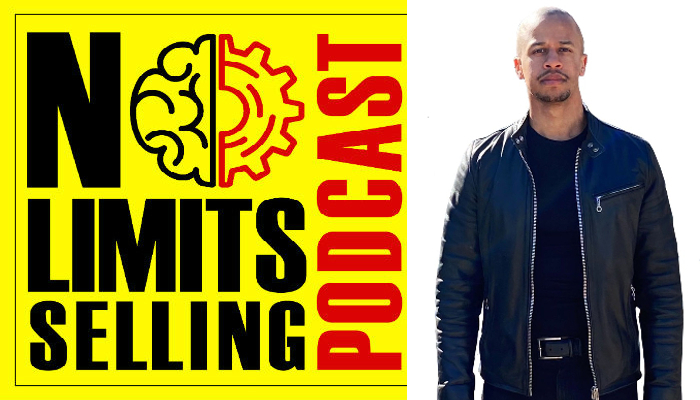How to Build a World-Class Brand by Hardy Haberland
On Episode 121 of The No Limits Selling Podcast, we have Hardy Haberland, a German serial entrepreneur, brand builder, and marketing expert. He is also hosting The Hardy Haberland Show. On the show, Hardy speaks with the most prominent masterminds and experts on the global stage.
He has since been mentored by some of the most experienced and innovative entrepreneurs, marketers, psychologists, and mathematicians, among other highly accomplished and respected world-class performers from eclectic areas (investing, chess, pro sport, etc.) in the United States and Germany.
Hardy used his specific knowledge to start or play a major role in several companies – including HaberlandPodcasts.com.

Contact Hardy:
Lastly, iTunes and everywhere else you can think of as well.
[EDITOR’S NOTE: This podcast is sponsored by No Limits Selling. It is a fun, fast-paced podcast that delivers hard-fought business advice that you can implement today to improve your sales and performance]
Interested In Our Real Estate Coaching Services? Explore Our Website: Link
Feeling Not Well Today? You Can Use Our Mindset Boosters App To amp Up Your Mood: Link
Find us on Social Media:
LinkedIn | Facebook community | Instagram
Like what do you listen to? Subscribe to our podcast!
Ready to become fearless? We can help you become fearless in 60 days so you accomplish more in your career Schedule A 15 min Call with Umar
Summary
Introduction and the Power of Podcasting
The podcast episode, titled "No Limits Selling Podcast," begins with host Umar Hameed introducing his guest, Hardy Haberland, who occasionally ranks in the top 100 podcasts on Apple Music. They discuss the nature of podcasting, likening it to a modern form of radio. Hardy expresses his love for the format, highlighting its ability to facilitate in-depth conversations with a variety of interesting people, including billionaires and individuals who have made hundreds of millions in sales.
The Evolution of Broadcasting
The conversation takes a historical turn as Umar brings up the concept of streaming from the late 1890s. He shares an anecdote about how people in Manhattan could call the Philharmonic and listen to the orchestra live over the phone, drawing a parallel to modern streaming services.
The Role of Desire in Success
The conversation then shifts to the topic of success. Umar asks Hardy why there is often a disconnect between people's desires and their achievements. Hardy suggests that the key to success is an "irrational obsession" or "irrational passion," which he refers to as "desire." He believes that with a sufficient level of desire and talent, success is inevitable.
The Impact of Fear
Umar brings up the topic of fear, suggesting that it can often prevent people from executing their desires. They discuss how fear can manifest in various forms, such as the fear of failure or even the fear of spiders. Hardy acknowledges that most people experience fear at some point.
Overcoming Fear
Hardy does not provide a specific strategy for overcoming fear. Instead, he suggests that if someone truly wants to create a business (or achieve any other goal), their desire should be strong enough to help them overcome their fears. He emphasizes the importance of truly wanting to achieve a goal to overcome any obstacles that may arise.
Conclusion
In the "No Limits Selling Podcast" episode featuring Hardy Haberland, the conversation revolves around the power of podcasting, the role of desire in achieving success, and the impact of fear on our actions. Hardy, a successful podcaster, appreciates the depth of conversation that podcasting allows and shares his experiences with a variety of interesting guests. He believes that an "irrational obsession" or "irrational passion," which he refers to as "desire," is the key to success.
However, he acknowledges that fear can often prevent people from acting on their desires. He suggests that a strong enough desire to achieve a goal, such as starting a business, can help individuals overcome their fears. The discussion provides valuable insights into the dynamics of desire, fear, and success.
Questions & Answers
Who is Hardy Haberland and what does he discuss in his episode on the "No Limits Selling Podcast"?
What is Hardy Haberland's view on the role of desire in achieving success?
How does Hardy Haberland suggest overcoming fear?
What are some key takeaways from Hardy Haberland's episode on the "No Limits Selling Podcast"?
Why is the "No Limits Selling Podcast" a must-listen for aspiring entrepreneurs?
Don’t miss this opportunity to transform your real estate career with one-on-one coaching. As an experienced real estate coach, I, Umar Hameed, am dedicated to helping you unlock your full potential and achieve your real estate goals. To learn more about who am I and my clients ↓
If you’re ready to take the next step, book an appointment with me today and begin your journey toward success in the real estate industry.
